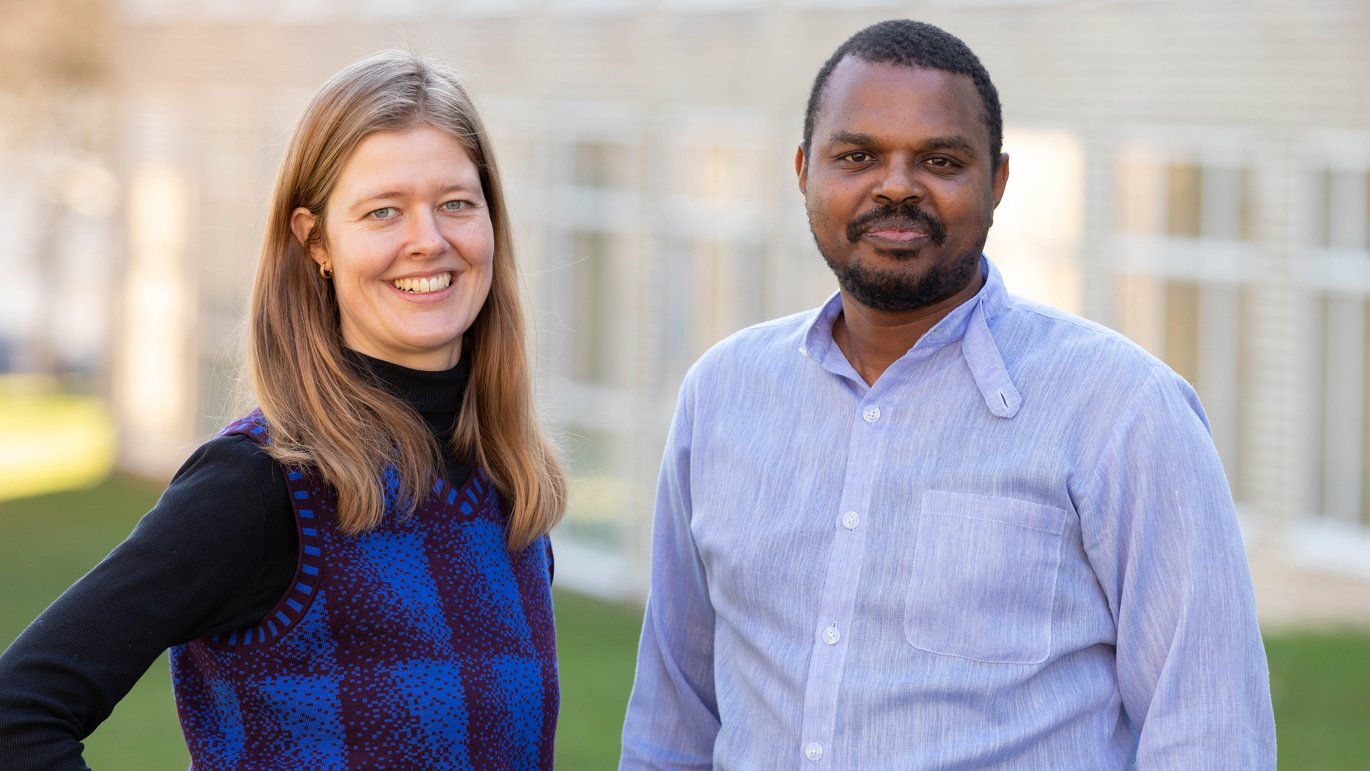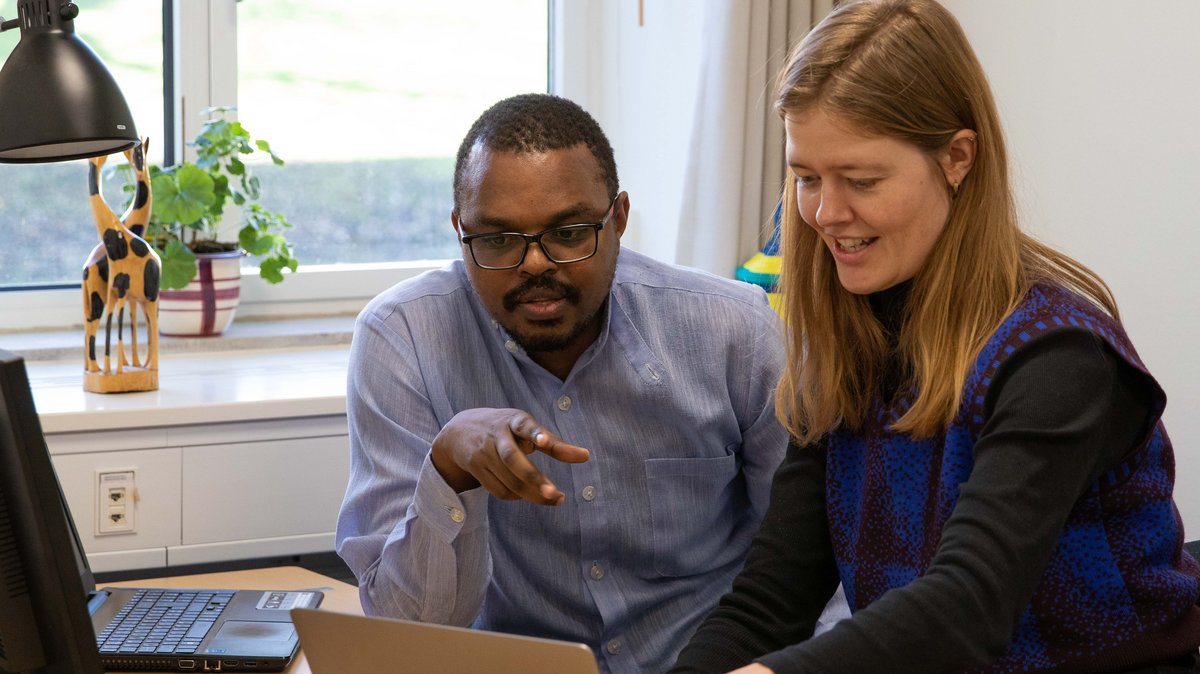Caroline from Denmark and Emmanuel from Rwanda are ‘PhD twins’
PhD student Caroline J. Arnbjerg and Emmanuel Musoni-Rwililiza are nearing the completion of their study on the psychoeducation for patients with bipolar affective disorder in Rwanda. The project arose in a somewhat unconventional manner, as the pair have written it together as a ‘Twin PhD’ across the continents.

As the third pair of PhD students in Global Health at the Department of Public Health to do so, Caroline J. Arnbjerg and Emmanuel Musoni-Rwililiza have been working on a joint ‘Twin PhD’ since 2019. The initiative was launched by Professor Per Kallestrup, who has also acted as their principal supervisor in the PhD process.
Emmanuel Musoni-Rwililiza from Rwanda is a psychiatrist, and in his home country he works at the University Hospital in the country’s capital, Kigali, as a head of the Psychiatric Department.
“When I was studying medicine, I did a lot of volunteer work together with Danish medical students. It is probably there in fact that the idea arose, because I heard through a friend about the concept of a ‘Twin PhD’, and that you could do this in Denmark,” says Emmanuel Musoni-Rwililiza.
Caroline J. Arnbjerg from Denmark is a medical doctor who plans to specialise in psychiatry. As a student, she also did volunteer work and worked with students from Rwanda.
“When I finished my internship, I was employed in a Transcultural Psychiatry department. My boss knew Emmanuel from his volunteer work, and they both knew Per Kallestrup, who is now our PhD supervisor. They asked me if I would like to meet Emmanuel in Rwanda to see if we could develop a PhD project together. They paid for my air ticket, and so I went to Rwanda for five weeks,” says Caroline J. Arnbjerg.
Rwanda’s first psychiatrist with a PhD
The pair initially held many online conversations, and to Emmanuel Musoni-Rwililiza, this social way of writing a PhD appeared very attractive.
“I’ve seen friends and colleagues who have written a PhD alone, and there were several of them who felt quite lonely, and who had major problems finding other people to discuss their project with. Some became burnt out, while others had to prolong their writing period by up to several years,” he says.
The research capacity at Kigali’s university is not large enough to create a PhD course, so it made sense for the psychiatrist from Rwanda to be affiliated with two universities at once. For Danish Caroline J. Arnbjerg, too, the idea of having a partner from Rwanda was also of great benefit in the work for global health.
“Traditionally, people from Western countries have done virtually all research in countries with lower incomes without involving the population. This does not contribute to building local capacity or a sustainable approach to research. So for me, the collaboration is all about the sustainability of the project, and that you don’t just do it for your own sake, but help to build something. When we have finished the project, Emmanuel will be the first psychiatrist with a PhD in all of Rwanda, and that really means something for the research environment in Rwanda for the years to come,” says Caroline J. Arnbjerg.
Emmanuel Musoni-Rwililiza is one of just 15 psychiatrists in Rwanda, which has a population of 14 million citizens. The country’s healthcare system is very different to that of Denmark, and without insider knowledge, Caroline J. Arnbjerg would not have known where to start.
“There is only one psychiatric hospital in the whole of Rwanda that provides inpatient care. It’s hard to see how to make a sustainable intervention that can actually happen with so few resources and make a difference in the long run. However, the insight that Emmanuel has from working in the area is unique,” says Caroline J. Arnbjerg. Emmanuel Musoni-Rwililiza continues:
“Our collaboration certainly benefits both parties. When I get home, I’ll be going back with a small part of Denmark in me, and I’ll bet that it’s the same for Caroline with Rwanda. We have a strong connection not just at the academic level, but also on a personal level.”

Psychoeducation of patients with bipolar affective disorders
The pair’s PhD project is based on a randomised study of patients with bipolar affective disorder in Rwanda. Together with doctors and psychologists, they have created a manual to help patients understand their diagnosis, which is adapted to suit patients in the Rwandese culture. The study followed about 150 patients in groups of 8-10 people, of whom approximately half received the manual and psychoeducation in groups, where they were told about the diagnosis at the hospital and what they could do to improve their situation.
“About 45 per cent of the patients in our study didn’t even know that they had the diagnosis – not because they had not been diagnosed, but because the sparse healthcare staff did not have the time to explain to the patients what was wrong, and also because there simply doesn’t exit words for psychiatric disorders in the local language Kinyarwanda” says Caroline J. Arnbjerg. Emmanuel Musoni-Rwililiza adds:
“That’s one of the reasons why a ‘Twin PhD’ is a really great idea. For many years, we’ve been trying to find ways to help the people of Rwanda, but in Denmark you have a lot more experience with psychoeducation, and it is an integral part of the way the healthcare system operates. So because I know the system and its challenges, it’s easy to pinpoint what we can learn from Denmark, and do some research that actually helps the people of Rwanda.”
The pair hope that the project and the associated manual can contribute to the general public’s knowledge of bipolar affective disorder, and thereby help a lot of people to live better and more informed lives with the disorder.
However, the project has not been without its challenges, because just a few months into the PhD process, the Covid-19 pandemic began, which resulted in a complete lockdown in Rwanda. It was not physically possible to travel in or out of the country, and so it was October 2020 that Caroline J. Arnbjerg was granted approval by Aarhus University to travel to Rwanda to start the project.
“We talked a lot online during this period and several times we thought about throwing in the towel, but Emmanuel could always cheer me up. Then, when I finally arrived in Rwanda, there was a curfew, and it was not permitted to go outside after 6:00 pm. I couldn’t even go to Denmark to visit my own family during Christmas, so Emmanuel took me home to his family to celebrate Christmas there. If we hadn’t had each other, I don’t think we could have completed the project,” she says.
The pair were in Rwanda for 14-15 months during the data collection phase, and are now in Denmark, where they are completing the project.
A project with great potential
The ‘Twin PhD’ concept has existed for ten years, on the basis of an idea from Professor Per Kallestrup, who wrote his own PhD in Zimbabwe in the same way. The initiative is still in a test phase, but the pair strongly recommend others to try it out.
“Writing a PhD has for many years been seen as an individual thing, so a lot of students may be reluctant to throw themselves into it as partners across continents until they have seen others succeed with it. Hopefully, our story can show that projects like this are actually feasible, and I hope that more people will look around for a twin in the PhD process,” says Emmanuel Musoni-Rwililiza. Caroline J. Arnbjerg adds:
“Being two people writing the same PhD can however also make it more complex in the start-up phase. How do you find the right match? How do you obtain funding for two people? How do you find a partner institution? And so on. But we have to get together in this way, if we really want to move the power structures that have existed for so many years in the world of research and create positive change globally.”
Contact
Doctor and PhD student Caroline J. Arnbjerg
Aarhus University, Department of Public Health – Section for Health Promotion and Health Services
Tel.: +45 2464 6449
E-mail: caroline.arnbjerg@ph.au.dk
Psychiatrist and PhD student Emmanuel Musoni-Rwililiza
Aarhus University, Department of Public Health
E-mail: musoni@ph.au.dk